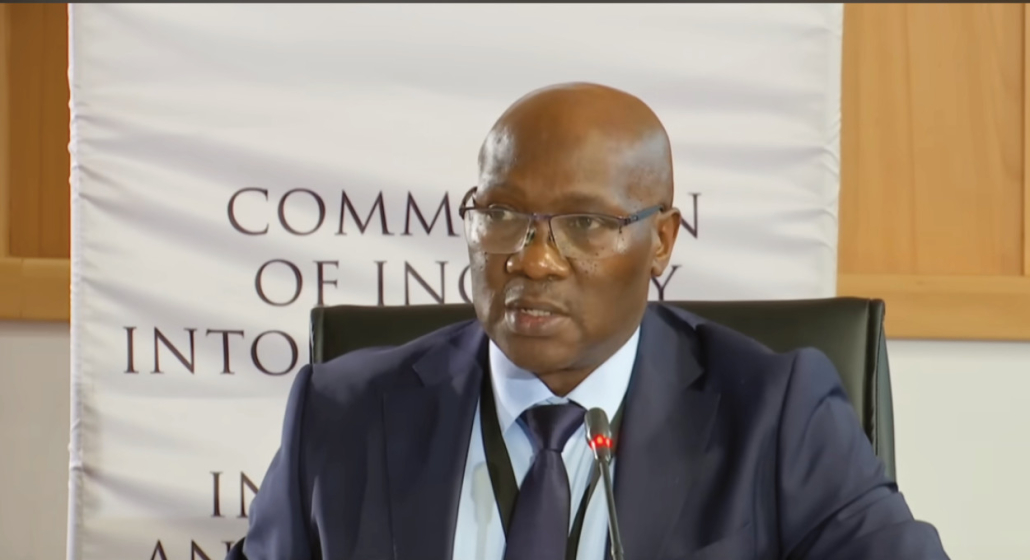The Madlanga commission took its first break this week since the start of its public hearings on 17 September, hearing only two days’ of evidence. It was in the middle of the testimony of Lieutenant-General Dumisani Khumalo, who heads up the crime intelligence division of the South African Police Service (SAPS), that the general took ill. He could not continue with his oral testimony on Wednesday, prompting the commission to halt its sitting on the day. It has since been declared that hearings would resume on 13 October.
Khumalo, under whose direction the Gauteng counter intelligence operations (GCI ops) team uncovered much of the evidence he is testifying on, started giving evidence on Monday, led by Adv Adila Hassim. He has so far revealed some of the details of what he calls the “big five” cartel of organised crime syndicates that have infiltrated the SAPS by developing relationships with some within its leadership in return for protection as they engage in major criminal operations.
To demonstrate this, Khumalo shared evidence of communication exchanged between suspected syndicate boss and attempted murder-accused Vusimuzi “Cat” Matlala and notorious North West businessman, Brown Mogotsi. This was done through mobile texts, which Khumalo testified were retrieved from Matlala’s phone upon his arrest in May this year. Matlala was recently denied bail in his case for the attempted murder of his former girlfriend, actor Tebogo Thobejane.
The texts show what appeared to be a quid pro quo relationship in which Mogotsi would be financially rewarded by Matlala for helping to intercept a police investigation into him, through alleged connections that go as high as Police Minister Senzo Mchunu.
There were also exchanges between Mogotsi and other individuals, one of whom is saved on Mogotsi’s phone as “Senzo Mchunu” and “Senzo Mchunu chief.” Khumalo said the analysis done by his investigations team, and the context in which the contents of the texts was framed, indicated that the communication was with Police Minister Senzo Mchunu and his chief of staff, Cedrick Nkabinde. In one of the texts to “Senzo Mchunu”, Mogotsi sends a link to a Constitutional Court judgment on a disciplinary case against a Brigadier Khumalo, citing it as a basis for how Dumisani Khumalo could be charged, supposedly as a means of thwarting his unit’s investigation into Matlala. Khumalo chuckled as he told the commission this week that in the text, Mogotsi had mistakenly believed that the Khumalo cited in the court case was him when it was someone else.
The texts between Mogotsi and Matlala go back to the end of 2024, when members of the GCI ops team raided Matlala’s Pretoria home in December in search of firearms suspected to be involved in the case he was later arrested in connection with. Mogotsi’s end of the conversations shared before the commission reveals an attempt to help facilitate a mission to squash the investigation – which he understood was led by the political killings task team (PKTT) established in 2018 in response to a rise in such incidents in KwaZulu-Natal – into Matlala.
The commission had earlier heard from KwaZulu-Natal provincial police commissioner Lieutenant-General Nhlanhla Mkhwanazi that the operations of the CGI team in relation to the Matlala investigation were accidentally thought to be those of the PKTT because the two teams shared some members – PKTT had members moved to Gauteng to help bolster the GCI’s investigative efforts in fighting organised and violent crime.
Mogotsi’s alleged political connections were first revealed by Mkhwanazi to the public during a media conference that precipitated the commission’s establishment. At the time, Mkhwanazi linked Mogotsi to Mchunu, whom he accused of interfering in the operations of the SAPS by ordering the disbandment of the PKTT in 2024, without just cause. A letter from Mchunu ordered the disbandment without explanation or justification, at the end of December.
Mkhwanazi further told the briefing that Mchunu was acting not out of public interest but to protect criminals whose dubious operations had been uncovered by the CGI team. Mchunu was placed on special leave by President Cyril Ramaphosa later in July, when he also announced the establishment of the commission.
As the first witness to appear before the commission, Mkhwanazi gave an overview of the inner workings of both the PKTT and the operational requirements of the SAPS leadership, particularly the authority of the national commissioner of police, to whom provincial commissioners like himself report.
Khumalo’s testimony, however, has gone into much more detail. It is anticipated that he will continue to make more revelations of the communications involving the people he has implicated.

